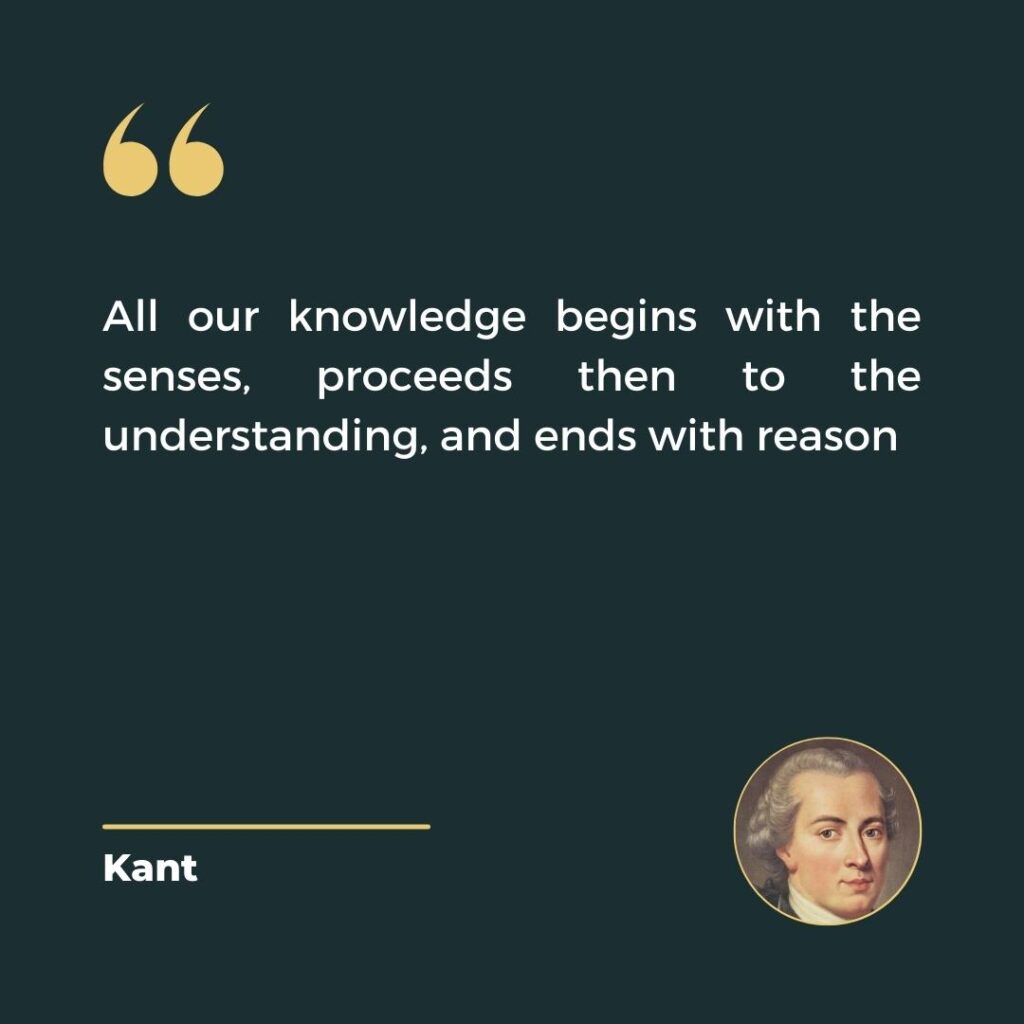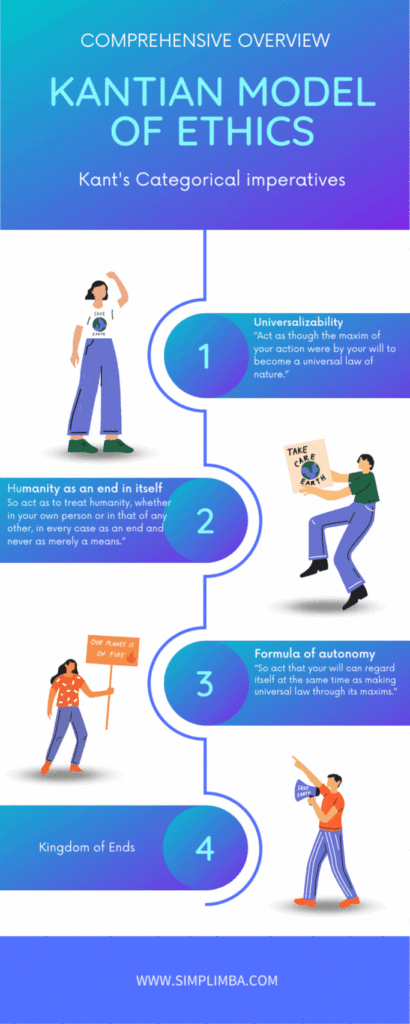
What is the Kantian model of ethics?
The Kantian model of ethics was developed by a German philosopher, Immanuel Kant. The model is a deontological model because it focuses on the duties of a rational rather than the ends or consequences.
According to Kant, no matter what you feel about a certain action or situation to fall under the right or wrong category, it will be considered right if it respects his categorical imperatives and wrong if it fails to respect the same. His categorical imperative is universal principles that identify moral from immoral. These principles apply to every human being irrespective of their opinion or thoughts about their situations.
What are Kant’s categorical imperatives?
Kant’s categorical imperatives are the rules that are universally applicable in every situation. Not only universal but these rules are unconditional as well. They apply to every human being regardless of their personal goals and interests.
Hypothetical imperatives are different from categorical imperatives as they apply according to the desires of people. But categorical imperatives bind rational beings to their moral duties. Kant’s categorical imperatives can be further categorized into three formulations. Let’s discuss them one by one.
Categorical imperatives are principles that allow for ethical decision-making within a particular situation but do not require general considerations of the person or their well-being. For example, one might apply the categorical imperative of loyalty to a friend in order to maintain amicable relationships. Such imperatives arise from deeper thoughts about a person and their role within society, rather than from specifics about what our friend may have done in the past.
This CU perspective on imperatives is unique in that it allows for abstraction. Abstract considerations can be applied across many contexts without falling into relativism or subjectivism. It is because of this feature that categorical imperatives are often seen as stronger principles than other ethical theories.
This contrasted with utilitarianism, which favors specific actions based on how they will affect specific people or groups. Utilitarianism also has difficulties accounting for abstractions, as each individual case must be weighed carefully. This led to the development of deontological ethics, which takes abstract ideas like loyalty and justice seriously and tries to derive general rules from them.
What are the 4 Formulations of Kantian Ethics?

Whether you’re a Kantian moral philosopher or philosopher in general, reading Emmanuel Kant’s categorical imperative can be daunting. The entire premise of Kantian is based on moral imperatives that drive a basic human being. The roots of Kantian Ethics can be found in the background of all major religions which drives human beings to behave in the most moral ways possible. The Eight Fold Path in Buddhism has also direct correlations which allow human beings to attain Nirvana
Kantian Model of Ethics: Formulation 1: Universalizability
“Act as though the maxim of your action were by your will to become a universal law of nature.”
Immanuel Kant
The first formulation of Kant’s categorical imperatives, Universalizability is also known as the principle of the law of nature. It states that one should act as though their actions will become a universal law of nature. According to Kant, If an act is morally correct, it must apply to everyone irrespective of their goals. But this law is applicable only in similar situations.
For example, someone who is in need of money borrows it or takes a loan and promises to return it. but he or she never returns it and decides to steal it by breaking their promise. On the other hand, there is a poor homeless family who is in desperate need of money and they borrow it on the promise of returning it. But due to their poverty, it is not possible for them to return it and thus they break their promise. These situations are similar but the morals aren’t.
Kantian Model of Ethics: Formulation 2: Humanity as an end in itself
“So act as to treat humanity, whether in your own person or in that of any other, in every case as an end and never as merely a means.”
Immanuel Kant
His second formulation is also known as the principle of ends. According to Kant, rational beings should not treat other human beings merely as a means to an end rather than an end in itself. This means one should treat fellow human beings with respect and value rather than manipulating them to fulfill their own desires and pleasures. They shouldn’t be used to accomplish a purpose but respected.
Kant believes that due to the ability to reason, rational beings have an intrinsic value. He also claims that reason motivates mortality, meaning we respect reason as the motive in all people.
Kantian Model of Ethics: Formulation 3: Formula of autonomy
“Act as though the maxim of your action were by your will to become a universal law of nature.”
Immanuel Kant
The formula of autonomy or principle of autonomy is the third formulation of Kant’s categorical imperatives. It states that one shouldn’t look up to others to guide him about right and wrong but rather decide for oneself by making a rational choice by reasoning which simply means do not follow others blindly and end up doing something which is morally wrong. Instead, use your own rational will to discover right from wrong and take actions that can be universalized. Kant also claims that people must follow categorical imperatives because of their rational will and not to fulfill their own desires or motive.
Kantian Model of Ethics: Formulation 4: Kingdom of Ends
People are obligated to act on maxims that would be accepted as a law in a multi-agent community that aims to maximize happiness given the principle of utility. Actions that aim to provide value to society should not be taken into account when approaching this spirit of goodwill.
Applications of the Kantian model of ethics
Kantian Model of Ethics: Application 1: Medical ethics
Humans possess the ability to think and reason which makes the basis of morality. Kant believed that the ability of humans to reason makes them remarkable. He also believed that all humans deserve respect and dignity. Margaret L. asserted that according to Kantian ethics a medical professional shall be glad if someone used their practices or if they used their own practices on other patients even if they are the patient themselves. She also argued that according to Kant, every patient should be well informed about their treatments and consent must be taken beforehand.
Medical research must be motivated out of respect for the patient and their values even if it risks them stopping their treatment. Jeremy Sugarman argued that Kant’s formula of autonomy suggests that people should be treated for their own goals rather than for the benefit of society.
Kantian Model of Ethics: Application 2: Abortion
Susan Feldman suggested according to Kantian ethics abortion is totally a woman’s decision of her free will. Women are in full control over what happens to their bodies hence their choice shall be respected. Carl Cohen asserted that even though fetuses aren’t rational, they still must be treated as an end in themselves just as a mother is treated as a rationale for her decision about abortion.
Kantian Model of Ethics: Application 3: Animal ethics
Kant believed that animals aren’t rational. They don’t have any moral rights, so we as humans don’t have any duties towards them but this doesn’t give us the right to be cruel to them. Because of their behavior towards other human beings. If one person treats animals harshly then they may paint a picture of harming others, even humans as an acceptable act.
Tom Regan rejected this Kantian model of Ethics on the basis that animals in fact do have moral thinking and they are self-conscious. they do make decisions about their life and should be treated as an end. He added that if Kant believes that animals lack rational thinking and reasoning, then there are certain humans as well who can’t make a moral judgment. Then they don’t have any worth either.
Kantian Model of Ethics: Application 4: Lying
According to the Kantian model of ethics, lying is against the categorical imperatives, so it is universally wrong. That is, wrong in every circumstance. Kant suggested one must not do the wrong to prevent a potential wrong even if the circumstances make it look like that. And even if that causes harmful consequences, you won’t be blamed as one was keeping true to his duty For example, you can’t lie to a murderer to save a victim’s life because you are not aware of the consequences it may cause.
Examples of Kantian Model of Ethics
Kantian Model of Ethics is absolutist and too rigid. There in lies the criticism for the model in a society that is practically riddled with vices and immoral behavior.
Kantian Model of Ethics: Example 1: Hide a Criminal
If you are protecting an innocent man from a criminal and if a criminal man comes to your door looking for the person, it becomes your responsibility to tell the criminal that he is with you.
Kantian Model Of Ethics: Example 2: Fire an Employee
If an outperforming employee has stolen a very insignificant amount from the treasury, it becomes imperative that you throw the person out as the Kantian Model of Ethics keeps a strong belief system against the principle of lying and stealing
Kantian Model Of Ethics: Example 3: Abortion
As discussed previously and according to Kant, that females should have a right to decide about the baby she is nurturing. Women are in full control over what happens to their bodies hence their choice shall be respected.
Samrat is a Delhi-based MBA from the Indian Institute of Management. He is a Strategy, AI, and Marketing Enthusiast and passionately writes about core and emerging topics in Management studies. Reach out to his LinkedIn for a discussion or follow his Quora Page
